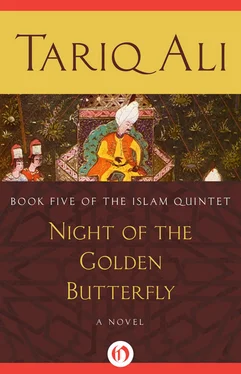‘Then it must be to do with him. Did you like him?’
‘No, but she did. Neither Zahid nor I were keen that she marry into the army.’
‘It must be Rafiq-related. Doesn’t make sense any other way. Have you asked her?’
‘She would never tell me. She’s become an alien as far I’m concerned. We had an old woodcut of our Sultan Suleiman of Yunnan. It belonged to Elder Granny and was probably inherited from her mother. Neelam had it framed and still treasures it, but Dù Wénxiù’s sultanate was never like what she imagines Islam should be and how it must impose itself on society. I said that to her once and she snapped back like a little dog. Sultan Suleiman was defeated because he wasn’t a true Believer; he allowed people too much freedom and that is corruption. I lost control at that point and slapped her face. She gave me a triumphant smile and left the room. I know it was stupid of me. What really makes me angry is the way she’s bringing up those children. They’re being indoctrinated. The boy is ten and is told not to talk to girls. The girl aged eight is being taught how to wear the hijab. Is she crazy? No wonder Rafiq went elsewhere for his pleasures.’
We discussed Neelam for a few hours without reaching any conclusion. I was about to leave when I remembered something. What, I asked her, had she written in the destroyed section of the diary that had so upset the teenage Neelam? Might that have prompted her conversion? Jindié coloured slightly.
‘It’s simply an account of our youth, of how close we once were and of my love for you. Some of it may have been expressed in strong and emotional language. I really can’t remember now except that I headlined it with an old saying: Fame is sweet, but youth is sweeter.’
‘Surely that can’t be a Chinese proverb, or have you substituted “youth” for “venerated ancestors”. As we know, they’re sweeter than everything else, a sentiment I’m beginning to appreciate more with each passing year.’
‘It’s Roman, not Chinese.’
‘Now they always did appreciate young men. There must have been something in what you said that upset young Neelam.’
‘She thought it was a secret from her father. Zahid was a sensitive and loving father. I have no complaints on that score. He told her all about the story of his friendship with you and that he knew about us long before we were married. I thought all that was good for her. Her parents were very open. I shouldn’t have destroyed those bits. I was in a temper.’
As I rose and thanked her for the healthy meal, she asked if I wanted to stay. There was a comfortable spare room and we could carry on talking. I asked for some coffee. There was none. But when it was midnight she did offer me a glass of red wine.
‘Why did you continue to stay with Zahid after he had become a Republican? The anger in your diary surprised me, but there seemed to be no follow-up.’
‘The children…’
‘After the children had left home?’
‘Perhaps because I had nowhere else to go. Sometimes I’ve bitterly regretted my decision.’
‘Jindié, how could that ever be a reason for someone like you? What an absurd idea. You could have lived comfortably anywhere in the world, and very comfortably in Lahore or Dali.’
‘Even though Zahid has changed a great deal, sometimes he is very much like you. He said almost exactly that at a very bad period in our relationship and made it clear that I would never be in need. It was when he suggested that we separate that I changed my mind.’
‘Just to be difficult?’
‘Partially. There was no other alternative, and by then I had got used to living with someone who did not mean much to me. I used to send his money to the Democrats and Ralph Nader. Everything changed after 9/11. He learned his lesson.’
‘Did he really save Cheney’s life in 2000, or is that another Fatherland myth?’
‘It’s true, but he was part of a team. He was so boastful. The children didn’t speak to him for a month.’
‘That was a good enough reason to walk out.’
‘Within twenty-four hours of 9/11, Cheney instructed his staff to make sure that Zahid was removed from his medical team. The Muslim name was enough. He came home that night looking like a beaten dog. We sold everything and left for London some months later. Did you know that he literally ran into Anjum by accident?’
‘These things happen. Who would have thought I would have met you again? Or him. Where did he meet Anjum? In Isloo?’
‘No, in some sweet-sounding Norfolk town. He was at some exclusive medical conference and had gone out for a walk by the sea. She recognized him. Zahid was stunned. She was wearing a skirt and blouse and a cross round her neck.’
‘What? She became a Catholic? What happened to that idiot she married?’
‘Alcoholic. Useless. Infertile. Impotent on every front. All his business projects failed. The last was an attempt to link up with an Irish building firm to build roads in the interior of Sind. Work was slow. They lost the contract. The chief engineer was staying with them. Anjum left Fatherland with him. He turned out to be a non-drinking Catholic fundamentalist linked to Opus Dei. Are they anything like the Falun Gong? Can you imagine? He forced her to convert, attend church every Sunday and make regular visits to the confessional. Zahid said she was so miserable that she started weeping as the horror stories poured out of her.’
‘Why didn’t he offer her refuge in Richmond?’
Jindié laughed.
‘He did, but she said her husband would track her down. She was really scared of him. That upset Zahid greatly.’
‘Just as well she dumped him when she did.’
‘Why? They both might have blossomed. I’m sleepy.’
‘You can’t stay up all night?’
She started laughing. ‘Too old now to spend a night with you in the garden.’
‘Neither of us is young. It’s pointless deceiving each other or exaggerating what were strong but youthful emotions. I still haven’t forgotten that you screamed Hsi-men at me. What were you doing reading the Chin Ping Mei at that age?’
‘It was at home, a very old edition in my father’s collection. Both Confucius and I used to read it in secret, but carefully, so that the volumes weren’t damaged. No self-respecting Chinese teenager in those days could admit to not having read some of it. At least in our language, it’s very funny as well as erotic.’
‘True, and even in translation, but how do you explain that there is not a single character, male or female, one can identify with?’
‘The anonymous author probably belonged to some obscure religious sect which saw human nature as evil and unchangeable.’
‘A bleak view of humanity.’
‘Not at all surprising in sixteenth-century China, where corruption, extravagance and the use of women as pleasure machines had affected everyone. There was a reason for the author to remain anonymous. The sex that Western readers enjoy so much was joyless. It was part of the degeneration of Chinese society and that is what he was exposing.’
‘Jindié. I’m not sure the author described lovemaking as joyless. Exploitative, male-dominated, but not joyless.’
‘It appeared so to me.’
She left the room and returned with one of her books.
‘I want to read something to you. It’s by Hsun-tzu, who was very hostile to the argument of Mencius that human nature is essentially good, but becomes corrupted by society.’
‘I agree with Mencius.’
‘The author of Chin Ping Mei didn’t. He agreed with Hsun-tzu that man’s disgrace is but an image of his virtue. Listen: “Meat when it rots breeds worms; fish that is old and dry brings forth maggots. When a man is careless and lazy and forgets himself, that is when disaster occurs.” He was attacking the rulers of the time for their refusal to accept moral responsibility.’
Читать дальше












